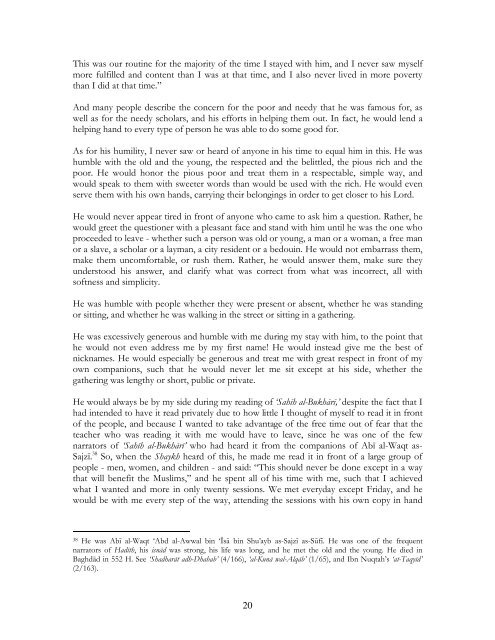The Lofty Virtues Of Ibn Taymiyyah
Many more Islamic media to read, listen, print and download at ww.IslamicGlobe.com and at www.QuranReciter.org
Many more Islamic media to read, listen, print and download at
ww.IslamicGlobe.com and at www.QuranReciter.org
Create successful ePaper yourself
Turn your PDF publications into a flip-book with our unique Google optimized e-Paper software.
This was our routine for the majority of the time I stayed with him, and I never saw myself<br />
more fulfilled and content than I was at that time, and I also never lived in more poverty<br />
than I did at that time.”<br />
And many people describe the concern for the poor and needy that he was famous for, as<br />
well as for the needy scholars, and his efforts in helping them out. In fact, he would lend a<br />
helping hand to every type of person he was able to do some good for.<br />
As for his humility, I never saw or heard of anyone in his time to equal him in this. He was<br />
humble with the old and the young, the respected and the belittled, the pious rich and the<br />
poor. He would honor the pious poor and treat them in a respectable, simple way, and<br />
would speak to them with sweeter words than would be used with the rich. He would even<br />
serve them with his own hands, carrying their belongings in order to get closer to his Lord.<br />
He would never appear tired in front of anyone who came to ask him a question. Rather, he<br />
would greet the questioner with a pleasant face and stand with him until he was the one who<br />
proceeded to leave - whether such a person was old or young, a man or a woman, a free man<br />
or a slave, a scholar or a layman, a city resident or a bedouin. He would not embarrass them,<br />
make them uncomfortable, or rush them. Rather, he would answer them, make sure they<br />
understood his answer, and clarify what was correct from what was incorrect, all with<br />
softness and simplicity.<br />
He was humble with people whether they were present or absent, whether he was standing<br />
or sitting, and whether he was walking in the street or sitting in a gathering.<br />
He was excessively generous and humble with me during my stay with him, to the point that<br />
he would not even address me by my first name! He would instead give me the best of<br />
nicknames. He would especially be generous and treat me with great respect in front of my<br />
own companions, such that he would never let me sit except at his side, whether the<br />
gathering was lengthy or short, public or private.<br />
He would always be by my side during my reading of ‘Sahīh al-Bukhārī,’ despite the fact that I<br />
had intended to have it read privately due to how little I thought of myself to read it in front<br />
of the people, and because I wanted to take advantage of the free time out of fear that the<br />
teacher who was reading it with me would have to leave, since he was one of the few<br />
narrators of ‘Sahīh al-Bukhārī’ who had heard it from the companions of Abī al-Waqt as-<br />
Sajzī. 38 So, when the Shaykh heard of this, he made me read it in front of a large group of<br />
people - men, women, and children - and said: “This should never be done except in a way<br />
that will benefit the Muslims,” and he spent all of his time with me, such that I achieved<br />
what I wanted and more in only twenty sessions. We met everyday except Friday, and he<br />
would be with me every step of the way, attending the sessions with his own copy in hand<br />
38 He was Abī al-Waqt ‘Abd al-Awwal bin ‘Īsā bin Shu’ayb as-Sajzī as-Sūfī. He was one of the frequent<br />
narrators of Hadīth, his isnād was strong, his life was long, and he met the old and the young. He died in<br />
Baghdād in 552 H. See ‘Shadharāt adh-Dhahab’ (4/166), ‘al-Kunā wal-Alqāb’ (1/65), and <strong>Ibn</strong> Nuqtah’s ‘at-Taqyīd’<br />
(2/163).<br />
20














